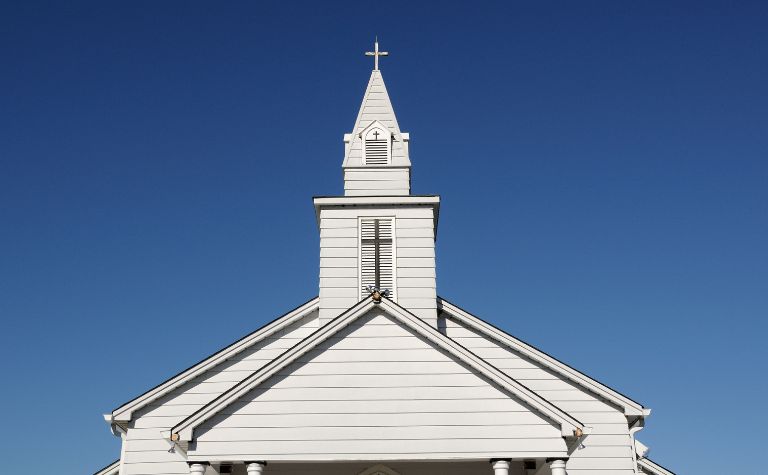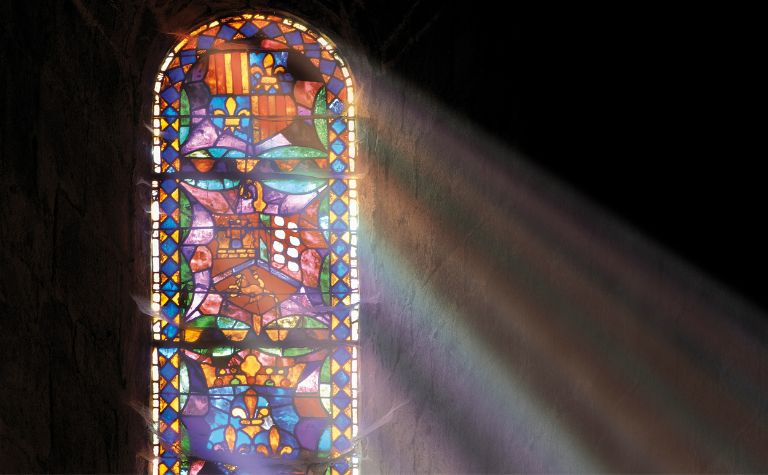The Church of Christ is a distinct Christian denomination with unique practices and beliefs that distinguish it from other groups within Christianity. Understanding these distinctions provides valuable insight into their religious worldview.
The Church of Christ believes in baptism for the remission of sins, signifying one’s faith. Each congregation is autonomous. Worship is a cappella, honoring early church traditions. They also partake in weekly communion as an act of remembrance, and the Bible guides their beliefs and practices.
How does the Church of Christ’s view of baptism compare with those in other traditions? How does their view of communion compare with other traditions? Keep reading, and see the comparison tables below to learn more.
Compare the Church of Christ with other churches on the Christian Denominations Comparison Chart.

The Church Believes in Baptism for the Remission of Sins
In the Church of Christ, baptism by full immersion in water is considered an essential act for the forgiveness of sins.
This belief is based on passages from the New Testament, such as Acts 2:38, where Peter says, “Repent, and be baptized every one of you in the name of Jesus Christ for the remission of sins.”
This contrasts with some Christian denominations where baptism is viewed as a public declaration of faith rather than a means for forgiveness of sins.
| Church of Christ | Symbolic View | |
|---|---|---|
| Meaning of Baptism | Baptism is considered a sacrament and is essential for salvation, as it is a part of the process of being born again in Christ. It symbolizes the death, burial, and resurrection of Jesus Christ. | Baptism is an outward expression of an inward faith, a public declaration of a believer’s faith in Jesus Christ. It is not necessary for salvation but is a symbol of the believer’s identification with Christ. |
| Necessity of Baptism | Baptism is a necessary part of salvation, believed to remove the guilt of sin. It is often referred to as “baptism for the remission of sins.” | Baptism is a commandment and an important part of a believer’s journey, but it is not seen as necessary for salvation. Salvation is believed to come from faith alone. |
| Mode of Baptism | The Church of Christ practices full immersion baptism, following what they see as New Testament examples. It is seen as a symbolic reenactment of the death, burial, and resurrection of Christ. | While some non-sacramental churches also practice immersion, others practice pouring or sprinkling. The specific mode is less important than the act of baptism itself as an expression of faith. |
| Age of Baptism | Generally, baptism is for individuals who are old enough to understand and repent of their sins, typically at the age of accountability or later. | This can vary widely. Some traditions practice infant baptism, while others, similar to the Church of Christ, only baptize those who are old enough to make a profession of faith. |
Autonomy of Local Congregations in the Church of Christ
Unlike many other Christian denominations that have a hierarchical church structure, the Church of Christ emphasizes the autonomy of each local congregation.
Each church is overseen by a group of elders chosen from the congregation, and they don’t report to any higher human authority. They believe this model aligns with the early Christian church as described in the New Testament.
| Church of Christ View on Local Church Autonomy | Hierarchical Church Structure View | |
|---|---|---|
| Church Governance | Each local congregation is autonomous and self-governed. Leadership typically includes elders and deacons selected from the local congregation. There’s no governing body outside the local congregation. | The local church is part of a larger organization and is typically overseen by a hierarchy of leadership, such as bishops or presbyters, who are often appointed or elected by higher church authorities. |
| Decision-Making Process | Decisions regarding doctrine, worship, and other church matters are made at the local level, often by the elders and/or the congregation as a whole. | Decisions regarding doctrine, worship, and other church matters are often made at a higher level and are implemented at the local level. Local church leaders may have some discretion but must adhere to the policies set by the higher authorities. |
| Accountability | The local congregation is accountable to its members and, ultimately, to God. It follows the Bible as its sole source of authority. | The local church is accountable to its members but also to the higher church authorities. It adheres to both the Bible and the established rules and policies of the church hierarchy. |
| Response to Disputes | Disputes are generally handled at the local level. If a resolution cannot be reached, there is no higher church authority to appeal to. The congregation must work towards a resolution internally. | In case of disputes, there is a defined process for escalation and adjudication at higher levels of the church structure. These higher authorities can intervene and provide a final resolution. |
Also see, What Does the Church of God Believe? to learn more.

A Cappella Worship
In most Church of Christ congregations, musical instruments are not used during worship. They believe that singing a cappella (without instrumental accompaniment) follows the New Testament’s example and directives more closely, as per passages such as Ephesians 5:19, “Speaking to yourselves in psalms and hymns and spiritual songs, singing and making melody in your heart to the Lord.”
Weekly Communion
The Church of Christ practices the Lord’s Supper (Communion) weekly, in each Sunday service. They believe that this practice closely follows the example of the early Christian church as outlined in Acts 20:7, where believers met on the first day of the week to break bread.
| Church of Christ | Catholic View | |
|---|---|---|
| Meaning of Communion | Communion is a memorial meal. The bread and the fruit of the vine (usually grape juice) are symbolic of the body and blood of Jesus Christ, reminding believers of Christ’s sacrifice. | Communion (also called the Eucharist) is a sacrament in which the bread and wine become the actual body and blood of Christ. This is referred to as transubstantiation. |
| Frequency of Communion | Communion is typically observed every Sunday, reflecting the New Testament practice of the early church in Acts 20:7. | The frequency of Communion can vary, but it is usually offered at every Mass. Some devout Catholics may partake daily, while others do so weekly or on special occasions. |
| Administration of Communion | Communion is usually distributed by the church elders or deacons. All baptized believers are encouraged to participate. | Communion is administered by a priest and is open to all baptized Catholics who are in a state of grace (i.e., not in a state of mortal sin). |
| Impact of Communion | Communion is an act of worship and remembrance. It deepens the believers’ connection to Christ and to one another but is not considered to contribute to salvation. | The Eucharist is not just a memorial but a real encounter with Christ. Catholics believe it provides spiritual nourishment and helps in the attainment of eternal life. |
Also see, What Do Pentecostals Believe? to learn more.

Bible-Centered Beliefs and Practices
The Church of Christ strongly emphasizes a direct approach to the Bible. They believe every doctrine, practice, and moral standard should be derived directly from the scriptures rather than from human tradition or interpretation.
This “speak where the Bible speaks, silent where the Bible is silent” approach is often referred to as “restorationism,” as it seeks to restore the church to the practices of the New Testament era.
| Church of Christ | Catholic View | |
|---|---|---|
| Church History and Authority | The Church of Christ seeks to restore the original practices and principles of the first-century church as depicted in the New Testament. They reject any human authority over the church and rely solely on the Bible. | The Roman Catholic Church values its two millennia of history and tradition. The authority of the Church is understood to be an extension of Christ’s authority, vested in the Pope and the bishops. |
| Role of Tradition | Tradition is viewed with skepticism if it seems to deviate from the New Testament model. The focus is on a “back to the Bible” approach. | Tradition, along with scripture, is a part of the Deposit of Faith handed down from the Apostles. It is valued and seen as a source of theological and doctrinal development. |
| View of Early Church | The early church, as described in the New Testament, is seen as the ideal model for Christian practice and belief. | The early church is highly respected, but the Roman Catholic Church also emphasizes the ongoing development and maturation of the Church through history. |
| Interpretation of Scripture | Interpretation of scripture is aimed at understanding and applying it as the early church would have. New interpretations or developments that cannot be directly linked to the New Testament are often rejected. | Scripture is interpreted in the light of tradition, guided by the teaching authority of the Church. New theological insights and developments can be accepted if they are in harmony with this tradition. |
Also, see What is the Largest Denomination in Each State? to learn more.
Related Questions
The Church of Christ is a conservative, Protestant, Christian denomination that started in America. It has 2,000,000 members and 40,000 churches worldwide. Many people are pleased to attend Churches...
Catholic vs. Protestant vs. Orthodox: What's the Difference?
Roman Catholicism, Protestant Christianity, and the Eastern Orthodox Church are the three historical branches of the Christian religion. Each tradition traces its doctrines and practices to the New...
